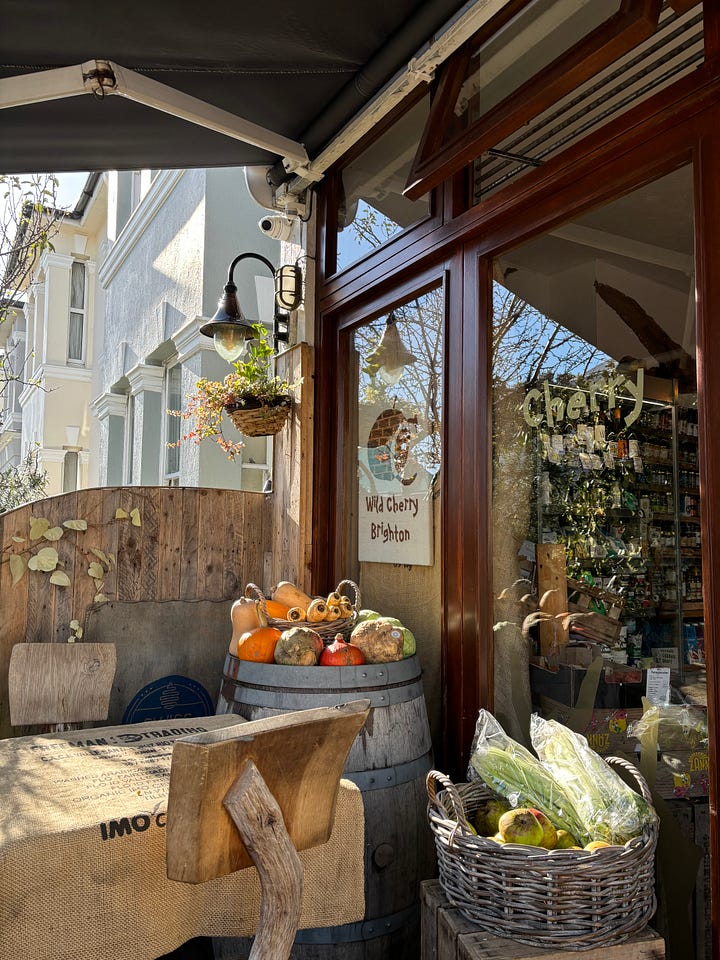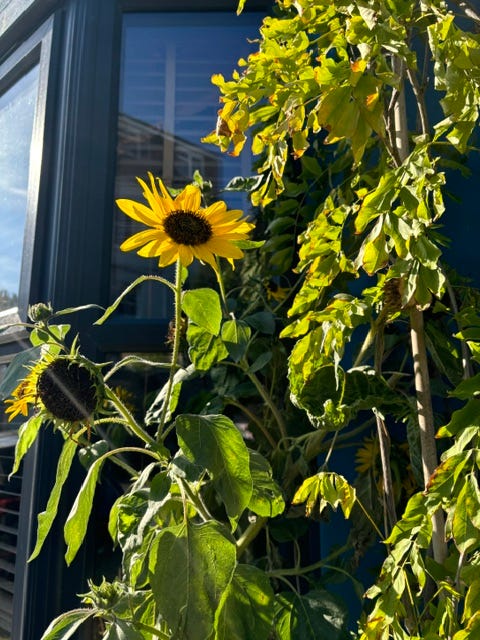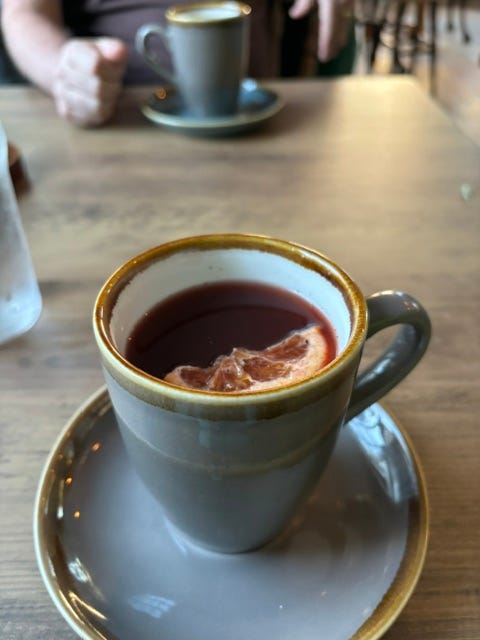Hi, readers of the intangibles! I’m essayist Allison Kirkland, and this publication is here to make the writing life more transparent, collaborative and community-oriented for writers of creative nonfiction and memoir. Thanks for being here!
If you look forward to receiving this email in your inbox and you can afford it, I invite you to upgrade to a paid subscription. Your $5/month will support an independent writer and make the literary landscape more accessible and inclusive.




Hi writers,
The weather has turned here in Brighton, and — to use a British phrase that I’ve fallen back in love with while living here — the nights are drawing in. (In case you missed it, my husband’s job has temporarily relocated us to Brighton, UK.) This month it is dipping into the 40s at night. But I’m relishing the coziness. The air smells sharp and clear, and my favorite pub smells like cinnamon and citrus because they are making mulled wine and heating the drafty old room with firewood instead of central heating.
In early October I celebrated my birthday (October 6th) by taking a long desired trip to Italy with my husband Paul. I had never been, and we couldn’t believe it was only a short plane ride away. We couldn’t resist!
We began in the Tuscan countryside and traveled to San Gimignano and Siena, making sure to eat lots of pici pasta and drink lots of crisp white wine. Then we took the train from Siena to Florence, a place I’d always wanted to visit. We stood in awe of Michelangelo’s David and wove our way through the ancient streets. We ate gelato every evening.
Each time I pass another birthday I remember what my high school home room advisor told my mom when I was in tenth grade. This tall, athletic white man looked at her during a parent/teacher conference and said: "The fact of the matter is, Allison's life will only get harder from here."
This was not the first time I'd heard something like this, but it was the first time I'd heard it from someone who had gotten to know me pretty well and had seen my good report cards and my friends and the confident way I moved through the world. It made my mom really mad to hear him say something like this, and she told me as much. But, honestly, he was right.
School can be a place of belonging and achievement for kids with disabilities, especially if they attend a school that makes room for them. I attended a K-12 school and by the time I graduated everybody knew what I was capable of because I’d had years to prove myself, and a supportive group of friends who trusted in my capabilities. But most disabled young adults discover that the "real world" is a little different and that life does get harder as they age.
Jobs become less accessible — either because people don't want to hire a disabled person (yes, this still happens, despite the ADA) or because the hours and physical effort needed for most jobs aren’t manageable for a disabled person with mental or physical limitations. Finding love becomes less accessible: ableist standards of beauty make dating much more exhausting, as disabled people looking for love have to navigate unique situations and types of rejection that don’t happen to their nondisabled peers (although, let’s be honest, dating is dismal for everyone). Friendships become more complex as nondisabled friends start reaching milestones that will take you longer to navigate, if they happen at all: getting married, buying a house, etc. Meeting new people can feel like an audition — will they be supportive? Will they trust my capabilities? Is there a magic phrase or a way of being I can inhabit that will help them realize I’m not so different after all? Will they accommodate my needs? Or will they categorize me as “other”? Will I have to prove myself, over and over again?
My home room teacher might not have known how to put it in words, but he knew the reality: the world is not built with disabled people in mind.
This is why growing up I had a really hard time visualizing what my future was going to look like. I didn’t know what would be accessible to me.
"The fact of the matter is, Allison's life will only get harder from here."
In the 1990s people were — and still are — content to share a statement like that … and stand by and continue to do nothing. I am guilty of that as well; for a long time, I didn't do anything because I didn't think there was anything I could do to make my adulthood easier, besides achieve and entertain people enough that maybe they'd forget about what my body looked like, even for just a moment.
"The fact of the matter is, Allison's life will only get harder from here."
Many years later I know how I'd ask my home room advisor to finish that sentence: "The fact of the matter is, Allison's life will only get harder from here .... because we live in an ableist world that communicates in so many ways that certain bodies and minds are more desirable, more able to succeed in our current working conditions and more worthy of love and belonging."
As far as I know this man wasn't doing his part to combat ableism. He wasn't advocating for laws to protect disabled workers. He wasn't calling out ableist language (like "crazy" or the r word) or actively asking me how he could make my adulthood easier.
In 1998 there wasn't even an inkling that something could be done about the fact that most disabled lives got more and more difficult. It was just something that everyone accepted. And, decades later, that’s still mostly the case.
But here’s what that man didn’t know: he didn’t know the richness and liberation that would come with creating and navigating my own life. And yes, the exhaustion, too. It’s exhausting to create your own world from scratch, to advocate for your needs in a world that doesn’t see them, to search out a supportive community. But it brings so many gifts along with it.
It has been over 20 years since my homeroom advisor said those words to my mom. You are reading my words today, in the publication that I created myself, that is supported by readers who want to hear what I have to say. What a gift. Happy birthday indeed.
Welcome, new subscribers! There are quite a few of you this month, and I am so glad you’re here.
Each month I offer a writing prompt and a reading recommendation for my paid subscribers. These prompts are geared toward writers of creative nonfiction and memoir, but they could also be useful for artists working in other mediums such as dance and visual art. (And remember: if you are a subscriber who is part of the disability community, send me a note and I am happy to comp you a year long subscription.)
I’ve been offering these prompts and recommendations for over a year now, and I am realizing that they’re perfect for writers who might not currently be attending a writing class, but who still want to engage with the creative nonfiction world and with their writing practice on their own time.
The first step to finding authority and authenticity in your writing, after all, is to write and read. Take some time to notice what resonates with you, notice what you like and what nags at you in other essays and books. Write a few lines yourself, within the safe confines of a prompt. You never know what starting these new habits might bring forth.



